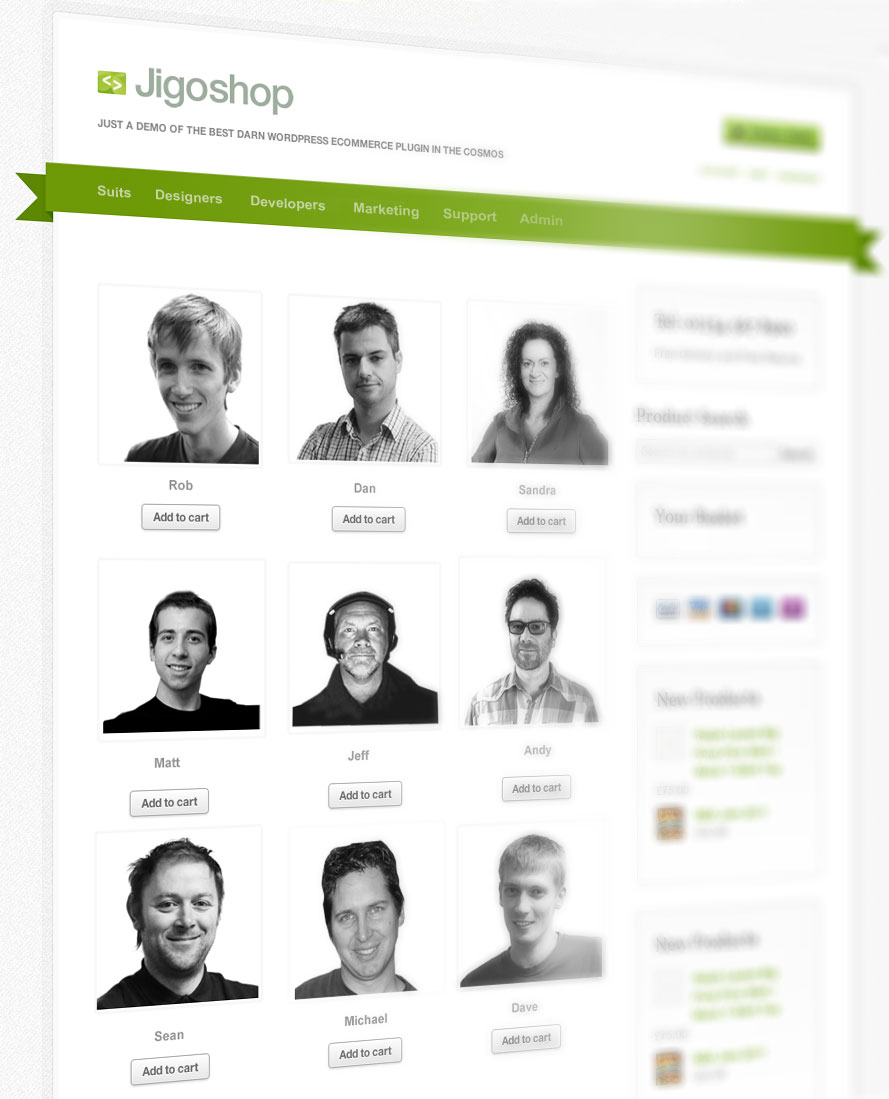Do’s And Don’ts For WordPress Startups
But what if you’re just starting out? What if you’re taking your first steps with a WordPress business? Where do you go for advice?
I’ve gotten in touch with a bunch of people running WordPress businesses to ask what advice they would give. I wanted to know what key pieces of wisdom entrepreneurs would pass on to people just starting out. On top of their input, I’ve thrown in a few of my own pieces of advice gleaned from working closely with so many WordPress businesses.
Further Reading on SmashingMag: Link
- How To Become A Top WordPress Developer
- Common WordPress Malware Infections
- Writing Unit Tests For WordPress Plugins
- Inside The WordPress Toolbar
Do’s
Bootstrap

The one-man band (Image: Serena Epstein)
 Bootstrapping your business means getting it up and running (and hopefully successful) without the help of any external investors, such as venture capitalists and angel investors. When I asked WordPress entrepreneurs what their do’s and don’ts for startups were, bootstrapping was not only suggested by many of them, it was wholeheartedly recommended by most, including Clay Griffiths of Headway Themes:
Bootstrapping your business means getting it up and running (and hopefully successful) without the help of any external investors, such as venture capitalists and angel investors. When I asked WordPress entrepreneurs what their do’s and don’ts for startups were, bootstrapping was not only suggested by many of them, it was wholeheartedly recommended by most, including Clay Griffiths of Headway Themes:
WordPress is a growing community and an incredibly robust platform to build off of. Starting a WordPress business is cheap; there’s no reason to sign away a portion of your business.
Part of what makes it so easy to bootstrap a WordPress business is that the community is so strong. A talented global team of developers works to keep WordPress fresh, up to date and powerful. When the key component of your business is not just free to distribute and free to use, but actively being developed, running the business becomes remarkably cheap.
For a WordPress business, bootstrapping shouldn’t be viewed as a last resort. It not. It’s something to be embraced. Here’s why:
- WordPress is free and GPL.
- A great community is behind WordPress.
- A lot of talented people actively develop and support it.
- When you do start turning a profit, that profit belongs to you.
Headway Themes is a great example of how successful and profitable bootstrapping can be and of how to grow a business from nothing but your own talent, skills and drive. Here are a few other examples:
- Developer Vladimir Prelovac made $80,000 from a single plugin, showing what you can do with just a bit of talent and commitment.
- Successful theme shop WooThemes was bootstrapped back in 2009, and its team is now 22 strong.
WordPress Features = Client Benefits

The cherry on top (Image: Farah_A)
When I contacted Michael Martin, who runs Pro Blog Design and formerly Pliable Press, he suggested that every WordPress business should be thinking about how to turn WordPress features into client benefits:
We as developers get excited about new updates, tools and features, but for clients and customers, it’s only the end result on their site that they care about.
Many clients and customers care only that their website works, is easy to use and does everything they need. They don’t care about WordPress, the GPL or the list of core contributors. What matters is their business. This means you can bundle all of WordPress’ features into a neat package of benefits for your clients.
What’s more, WordPress’ regular release cycle enables you to give clients new benefits all of the time. WordPress 3.3 came with a drag-and-drop media uploader, which many of my clients were excited about. WordPress 3.4 comes with a theme customizer and theme previewer that end users will love. It’s a great time to get in touch with your clients and make a fuss about what these features will do for them.
Encourage Feedback
 ManageWP provides nine different ways for users to give feedback, including a Google Group, in-app support ticketing, email, the support forum and Twitter. Always to the point, here’s what Vladimir Prevolac, CEO of ManageWP, has to say:
ManageWP provides nine different ways for users to give feedback, including a Google Group, in-app support ticketing, email, the support forum and Twitter. Always to the point, here’s what Vladimir Prevolac, CEO of ManageWP, has to say:
User feedback is gold.
When your business is up and running, feedback from users is critical to making tweaks and adjustments and adding new features. You may be in business to make money, but your means of making money is by making customers happy, which is why listening to what they have to say and seriously reflecting upon it is important. User feedback won’t always be practical or relevant, and you’re free to disregard it, but keep in mind that your users are on the frontline. They will have insights that you just won’t have, and they could be the ones who generate your best ideas.
Provide Excellent Support
For Lisa Sabin-Wilson, founder of Allure Themes, one of the most important elements of a new WordPress business is its support system.
Never ever underestimate the power of a good solid support system. By this I mean the mechanism of supporting your products and being available to answer questions and solve problems for your user community.
 Users are more willing to deal with bugs in a new product if the communication and support are good. This will keep customers happy by ensuring that they know you care about them, and it will keep you happy because bugs will be reported and dealt with efficiently. No matter how good your product is, a poor support system will annoy and alienate customers.
Users are more willing to deal with bugs in a new product if the communication and support are good. This will keep customers happy by ensuring that they know you care about them, and it will keep you happy because bugs will be reported and dealt with efficiently. No matter how good your product is, a poor support system will annoy and alienate customers.
Here are Lisa’s tips for setting up and maintaining a professional and efficient support forum:
- Be timely, polite and friendly with support requests.
- Investigate the best method for providing support, and test that the system actually works.
- From the first sale, be prepared to provide support, with no delays or technical problems.
Get Involved
When I asked Garth Koyle at Event Espresso what he would recommend to WordPress startups, this was at the top of his list:
Get involved in the WordPress community by speaking, sponsoring and giving back.
 If WordPress powers your business or generates your livelihood, getting involved with the community is a great way to say thanks. You don’t need to be a programmer to get involved. Contributing code is one way, but there are plenty more:
If WordPress powers your business or generates your livelihood, getting involved with the community is a great way to say thanks. You don’t need to be a programmer to get involved. Contributing code is one way, but there are plenty more:
- Contribute to the WordPress Codex.
- Help on the support forum or IRC chat.
- Write and distribute a plugin or theme.
- Join the theme review team.
- Submit a patch.
- Report bugs, actively look for bugs or patch them.
- Get involved in the user interface and user experience.
- Translate WordPress.
- Test WordPress.
- Get involved in BuddyPress.
- Help to organize a WordCamp.
- Get involved in a Meetup group.
- Speak at a WordCamp or Meetup.
- Write tutorials or guides on your blog.
- Link to WordPress from your website, displaying a button or the logo.
- Donate to a theme or plugin developer.
As you can see, there are plenty of ways to contribute to WordPress. Just dive in!
Research Your Market
Someone called me up recently saying that he’d been doing this thing for friends and family that he thought would make a great business idea, and he asked what I thought. I asked him whether anyone had paid him to do it yet; he said no. I asked him whether anyone had offered to pay him to do it yet; again, no. The next thing I suggested was that, before putting the time and effort into it, perhaps he should do some research.
It doesn’t matter how good you are at something; if no one wants to pay you to do it, you ain’t got a business.
 This is what I tell anyone who tells me about their great business idea. Before doing anything else, do some research. If you’re convinced of your idea, launching right into it can be tempting; you’re inclined to set up a website and start developing the business without actually knowing whether anyone will pay for it. Having confidence is good, but this is just crazy.
This is what I tell anyone who tells me about their great business idea. Before doing anything else, do some research. If you’re convinced of your idea, launching right into it can be tempting; you’re inclined to set up a website and start developing the business without actually knowing whether anyone will pay for it. Having confidence is good, but this is just crazy.
When Words for WP was just an idea floating around in my brain, the first thing I did was create a Google form and send it to people to get some feedback. I sent it not to my family and friends, but to people who would potentially want to buy what I wanted to sell. Setting up a Google form is really simple (or, if you prefer to stay in WordPress, you could use Gravity Forms); all of the information is collated into a spreadsheet, and graphs can be generated. Many people responded to my request and, to my delight, a few of the responses were “When can you start?”
Market research is crucial to figuring out whether your business idea will work, and the Internet makes this really easy to do. Ask questions that will get the answers you need: make sure to find out what people would pay for the service or product and what they expect from it. You can use this information not just to launch the business, but to return to again and again.
Be Proactive With Clients
For a company that deals with verticals, such as happytables, interaction with clients is essential to running the business. That’s what Noel Tock had to say when I asked him what he would suggest to people starting out with a WordPress business:
Talk to your clients whenever you get a chance, be proactive and initiate discussions. Their feedback will be invaluable in shaping the early stages of your product. Startups are no place to be reactive.
This harks back to Vladimir’s advice about feedback and my advice about market research, but it demands even closer interaction with clients. Don’t wait for them to come to you; go to them. Running a service for restaurants means that Noel has to know exactly what those clients need and then tailor his services accordingly. This entails actual face time with clients, talking to them about their business.
Rather than ask clients what they need from a website, get them to talk at length about how they run their business, what their own customers need and how they deliver that. Be receptive, and generate ideas based on what your clients tell you they do. Remember that you’re the expert on WordPress, which means that, if you’re listening to the client, you’re best equipped to figure out what solution would suit them. It would be much more difficult for someone with no knowledge of WordPress to get a handle on what the software can do.
Be Committed and Have Faith
Taking the first step in running a WordPress startup is pretty daunting. Some of the most successful WordPress startups were started as hobbies. When it’s still a hobby, it’s easy to doubt whether this thing you love to dabble in could turn into a money-making enterprise. A year ago, the WordPress marketplace seemed crowded with theme shops, and for a while it looked like it would be difficult for new businesses to break through. However, we’ve seen an explosion of entrepreneurs using WordPress in new and exciting ways, and hopefully that trend will continue. It’s a great time to think both laterally and vertically about how to use WordPress. You will doubt yourself, but if you’re good at what you do and are tenacious and persistent, you will succeed.
Here are some people who did:
- Brian Gardner talks about founding StudioPress.
- Lisa Sabin-Wilson talks Allure Themes.
- Sally and Joshua Strebel talk about their startup, Page.ly.
- ManageWP reflects on reaching 2000 paying customers.
- Grant Griffiths talks about starting up Headway Themes with son Clay.
Don’ts
Go It Alone
When I asked Dre Armeda, CEO of Sucuri Security, for his tips for WordPress startups, he answered in less than a second:
Don’t go it alone! Embrace partnership, but make sure to do your due diligence. Bad partners can ruin a startup as quickly as trying to go at it alone.
 Finding a partner to work with is not always easy. A potential business partner won’t necessarily be your best friend or someone you’ve known for years, but they will hopefully be someone with business skills that complement yours. There are many stories of people meeting at a conference, clicking with each other’s personality and finding an opportunity to form a business partnership. It’s wholly different to any other relationship, and the right business relationship can be vital ingredients in a successful startup.
Finding a partner to work with is not always easy. A potential business partner won’t necessarily be your best friend or someone you’ve known for years, but they will hopefully be someone with business skills that complement yours. There are many stories of people meeting at a conference, clicking with each other’s personality and finding an opportunity to form a business partnership. It’s wholly different to any other relationship, and the right business relationship can be vital ingredients in a successful startup.
That being said, make sure that not too many partners are making decisions at the top. If no one can take the reigns and make snap decisions, then the business might chug along slowly or even grind to a halt. Justin Tadlock has some excellent advice on his blog, drawn from his own experience with DevPress:
The other issue that we ran into is the too-many-chiefs-not-enough-Indians scenario. Since we were all four the owners of the site (equal ownership), each decision had to be agreed upon. For those of you starting up your own business, take my advice: Elect a single shot-caller, one person to make most of the decisions and manage day-to-day operations. Bigger decisions can be made as a team, but smaller things need to be decided upon in a timely fashion so you can move on to the next thing you need to work on.
Business Is More Than Just Your Product

The open-source community is a great place to be; there’s nothing quite like free software (i.e. free as in free speech, not as in free beer). And, well, even if you hate it, if you’re releasing a WordPress plugin and theme, then you must release at least part of the product under the GPL. WordPress companies have been extremely successful at working within the terms of the GPL, and it’s made the community more creative overall. But it’s not all shiny and nice, as the team at Jigoshop told me:
Don’t assume that open source means that you won’t get stomped.
Last year, the Jigoshop plugin was forked by WooThemes, resulting in WooCommerce. Forking happens when someone takes a piece of open-source software, creates a new package and starts independently developing it themselves. This is perfectly within the terms of the GPL, and if you want to be a part of the WordPress community, then this is a risk you have to take — and it’s especially risky if your product is really awesome.
So, particularly in an open-source community, your business needs to be more than just your product. Here are other things to consider:
- Branding,
- Customer service,
- Support,
- Documentation,
- Team.
Put time into developing all aspects of your business, not just the plugin or theme. Jigoshop had (and continues to have) huge community support. My advice to anyone in the open-source community: be more than your code.
Set It and Forget It
When it comes to WordPress businesses, Lisa Sabin-Wilson says there’s no such thing as a “set it and forget it” business model:
Anyone thinking that they can put up a few themes (or plugins or… whatever) on the Web, put a price tag on them and think that is all they need to do in order to watch the dollars roll in is in for a reality check.
 WordPress is evolving, and it’s evolving fast. And commercial WordPress products and services need to keep up with its development cycle. In other words, your WordPress business needs to evolve fast, too. And you don’t have any choice in the matter.
WordPress is evolving, and it’s evolving fast. And commercial WordPress products and services need to keep up with its development cycle. In other words, your WordPress business needs to evolve fast, too. And you don’t have any choice in the matter.
You will always need to be ready to add support for new WordPress features. When it comes to themes, for example, would you pay for a theme that doesn’t support WordPress 3.0 menus? There are some still out there!
Be prepared to upgrade your product or service based on new design or development trends, such as responsive design and WordPress Multisite, and to keep in line with browser upgrades. A commercial user community expects you to keep a product they’re paying for up to date.
And, of course, you’ll be spending a lot of time answering support requests, updating documentation and marketing the product. Your WordPress business won’t just be a full-time job; it’ll quite possibly take up every waking hour you have!
Be Let Down by Your Content

Go back to scoohl. (Image: xtoq)
 A company came to me last year and asked if I could write content for its new WordPress theme shop. It had run a theme shop before, but the shop had recently closed down. When I asked them why they thought the business had failed, they said that a major problem was poor content on the website and lack of documentation for their themes.
A company came to me last year and asked if I could write content for its new WordPress theme shop. It had run a theme shop before, but the shop had recently closed down. When I asked them why they thought the business had failed, they said that a major problem was poor content on the website and lack of documentation for their themes.
The thing about content is that, when it’s done right, you don’t even notice it; it just blends in with the overall business. But if it’s done wrong, it is glaring. Typos, grammatical errors and misspellings on a website give an overall impression of unprofessionalism and lack of attention to detail. With care and attention, getting the content right is pretty easy, so if your business is getting it wrong, then you’re sending dreadful signals about your ability to do difficult things such as write code. Appearances matter.
The same goes for documentation. Documentation shows clients and customers how to use your product or service correctly. A lot of startups launch without any sort of documentation whatsoever. Giving people a tool without instructions only stores up problems for you. Expect support forum requests and emails from annoyed customers who can’t figure out how to use the product.
Forget to Delegate
ManageWP started out as an idea in the head of Vladimir Prelovac. Now, his team consists of 13 people, and it is still expanding. Vladimir says:
Don’t think your startup is you. Trust that your team can do certain things equally as well as you, if not better.
 Learning to delegate to other people is important. Personally, I find this difficult. I try to do everything myself, which eventually leads to burnout. It took me quite some time to take on another writer, but now that I have, I can fully see the wisdom in Vladimir’s suggestion.
Learning to delegate to other people is important. Personally, I find this difficult. I try to do everything myself, which eventually leads to burnout. It took me quite some time to take on another writer, but now that I have, I can fully see the wisdom in Vladimir’s suggestion.
There are people who can do things as well as you. And there are people who can do things better. As the founder of a business, your job is to find the best possible people, not to try to do everything yourself. When you employ people to work for your startup, delegate tasks to them and make use of this expertise at your fingertips. Dividing your time between a lot of different tasks can be detrimental to your own workflow, and it leaves employees waiting for you to take action on a project. Let designers design and developers develop, while you take charge of developing and growing the business.
Hack the Core
Finally, a suggestion from Adii at WooThemes:
Never — ever(!) — hack the core!
 Hacking the core means making changes to WordPress’ core files. You might, for example, want to change WordPress’ functionality and feel that hacking the core is the best way to do it. It’s not. Here’s why:
Hacking the core means making changes to WordPress’ core files. You might, for example, want to change WordPress’ functionality and feel that hacking the core is the best way to do it. It’s not. Here’s why:
- Every time you update WordPress, you’ll have to do it manually to ensure that you don’t overwrite your hacks.
- It can cause incompatibility with plugins.
- You will make WordPress unstable.
- You will make WordPress insecure.
- You could make life difficult for clients and customers. What if they update WordPress and overwrite your changes?
- You would make life difficult for other developers who take over your project but do not know what changes you have made.
- You would be giving up all of the experts who work on WordPress to go it alone. In that case, why bother using WordPress at all?
If you’re getting an itch to hack the core, why not try these options instead?
- Submit a ticket to WordPress Trac to see if you can get the functionality that you need included in the core.
- Build a plugin with the functionality you need. You don’t have to distribute it; just use it to make the changes you need.
Conclusion
It’s a great time to get involved with WordPress. The global community is solid and growing all of the time. WordPress is expanding into new and exciting areas, and it is the perfect platform on which to build a business. Because of its ease of use and solid development base, more and more people are looking to use it for their business. And you can use it to produce unexpected results.
If you’re just about to embark on an adventure of your own, I hope the tips above have given you some ideas to ponder. And if you’re already running a WordPress business or just starting up, please do share your experiences in the comments.


 Get a Free Trial
Get a Free Trial

 Register For Free
Register For Free JavaScript Form Builder — Create JSON-driven forms without coding.
JavaScript Form Builder — Create JSON-driven forms without coding.
 How To Measure UX and Design Impact, 8h video + UX training
How To Measure UX and Design Impact, 8h video + UX training


